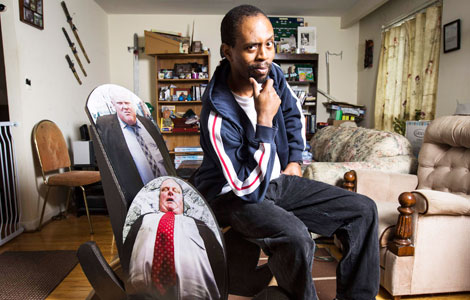WASHINGTON - The Senate Intelligence Committee and Central Intelligence Agency still have major disagreements over a huge report the committee is trying to complete that is highly critical of harsh counter-terrorism practices such as "waterboarding," which the agency used under President George W. Bush.
Both congressional and intelligence officials confirmed that the CIA continues to dispute significant aspects of a draft of the report which the Senate committee approved a year ago. It runs to thousands of pages and remains highly classified.
The dispute - and revelations by former government contractor Edward Snowden about sweeping electronic surveillance by the National Security Agency - have sparked political debate over whether congressional oversight of US spy agencies is effective enough.
Four years ago, after President Barack Obama took office, the intelligence committee, chaired by California Democrat Senator Dianne Feinstein, launched a sweeping investigation into Bush administration practices, reviewing millions of pages of ultra-secret reports documenting the handling of militants.
However, as criminal investigations related to CIA interrogations were continuing, the committee did not interview key witnesses, including CIA officials involved in the agency activities. This prompted some agency supporters to question the Senate report's balance.
Over the past year, the CIA laid out its concerns about the Senate committee report in written submissions and meetings with committee officials.
Committee aides said the panel hoped to finish work on an updated version of the report, taking note of CIA comments, by the end of the year. The committee could then vote to request declassification, which would allow the public to see the report, or at least parts of it.
Disagreements between the CIA and the Democratic majority on the Committee, who conducted much of their inquiry without committee Republicans' involvement, appear to be profound.
Officials familiar with the draft report said committee investigators' made highly critical assessments of the value of controversial practices like the creation of "secret prisons" overseas where harsh interrogation techniques, including "waterboarding" and sleep deprivation, were used on captured militants.
Little Intelligence Gained
According to officials, Committee Democrats concluded that the CIA obtained little or no critical intelligence from the use of secret prisons and harsh interrogations tactics - which human rights advocates characterize as torture - which could not have been obtained through non-coercive methods.
Harsh interrogation methods were used on some of the most high-profile militants captured by the U.S. in the wake of the Sept. 11, 2001 al-Qaeda attacks on New York and Washington. They were disowned and condemned by the Obama administration after the President took office in 2009.
Officials said the Senate committee report acknowledges that the use by the Bush-era CIA of a practice known as "rendition" - in which captured militants were transferred without legal process by the CIA to third countries where they were often mistreated - did produce useful intelligence.
The Obama administration has not renounced the use of rendition, and has used the CIA to facilitate extrajudicial transfers of captured militants for questioning by US personnel and processing in the US judicial system.
U.S. officials said that CIA's view is the Senate Committee is wrong to assert that harsh interrogations and the secret prison program produced no intelligence which proved useful in exposing dangerous militants or terrorist plots.
The CIA's current director, John Brennan, was a senior agency official when the harshest CIA tactics were in use. Officials said that in closed-door meetings with Congress, he complained the Senate report contained major inaccuracies.
The CIA confirmed that it disputed committee findings.
"Our response agreed with a number of the study's findings, but also detailed significant errors in the study. Since that time, CIA and Committee staff have had extensive dialogue on this issue and the Agency is prepared to work with the Committee to determine the best way forward on potential declassification," said CIA spokesman Dean Boyd.
The agency's reservations about the Committee inquiry were echoed by Senator Saxby Chambliss, the committee's top Republican. "I believe that this study is significantly flawed and does not accurately portray history. Therefore, the committee should not pursue to de-classify the study," Chambliss said.























